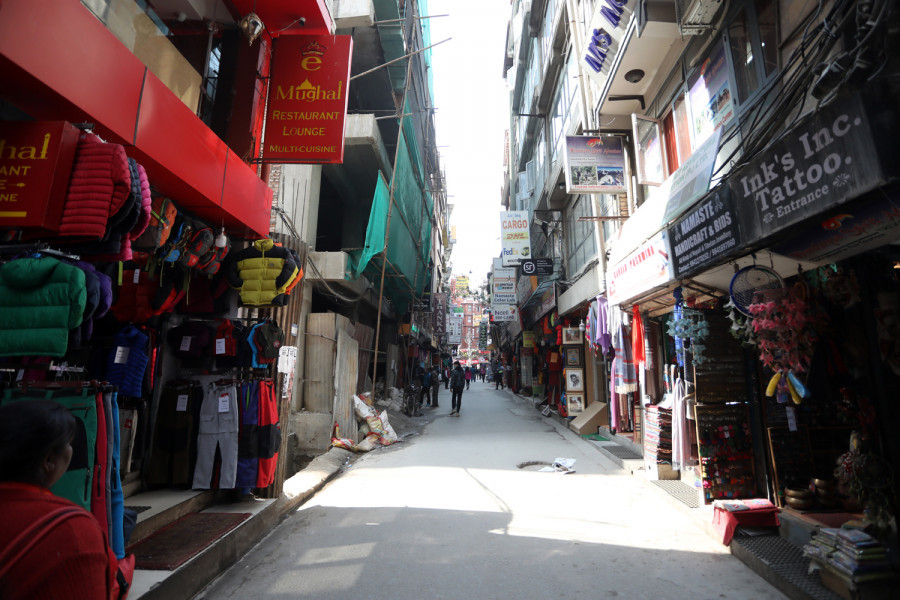Money
Thamel businesses offer packages to attract Nepalis to stay afloat with mixed success
Hotels and restaurants say they have slashed prices by as much as 50 percent but the perception that Thamel is only for tourists keeps potential domestic customers away, they say.
Tsering Ngodup Lama
This time last year, Dom Himalaya Hotel, at Thamel, was bustling with people. In the mornings, the hotel’s restaurant had guests queuing up for the buffet breakfast, and throughout the day, there was a continuous flow of guests coming in and going out.
Rooms at the hotel were selling at more than $70 per night and the daily occupancy was anywhere between 85 to 100 percent.
But a year later, things are completely different.
These days, except for a handful of guests, the hotel is eerily quiet. Even though rooms now sell for less than half the price a year ago, the hotel’s average occupancy is only around 30 percent.
Dom Himalaya Hotel’s case is not an outlier in Thamel, Kathmandu’s tourist hub. Before the pandemic, 98 percent of the hotel’s clientele was foreigners. The same is the case with the majority of the businesses in the area, and with tourist arrivals hitting rock bottom, businesses have had to repurpose and adapt as they attempt to stay afloat amidst the biggest crisis businesses in the area have ever seen.
The government opened the country for tourists from December 13, 2020, but there are quarantine restrictions and as such the flow of tourists is minimal. Last year saw the worst tourist arrivals in the country in 34 years.
“When the government announced nationwide lockdown in March last year, many foreign tourists who were in Nepal got stuck in Kathmandu and couldn’t leave,” said Mandip Raj Giri, Dom Himalaya Hotel’s director. “Many of these foreign tourists ended up in Thamel staying at hotels like ours. The last of those guests left our hotel in June.”
Giri knows he was one of the fortunate ones to still have some revenue coming in despite the nationwide lockdown.
Like most businesses in the country, Black Olives Cafe, a multi-cuisine restaurant located in Thamel’s Chaksibari and catered primarily to foreigners, closed on March 23, 2020, the day before the nationwide lockdown.
Even though many restaurants in different parts of Kathmandu had already started opening from September, Black Olives Cafe reopened only from November 2020.
“We chose to remain closed because there were simply no foreigners in Thamel,” said Shankar Neupane, the restaurant’s owner. “Opening with no business only meant incurring operational costs.”
But by November, when Neupane realised that the situation wasn’t going to get any better, he decided to open and do something his business had never done before—target the domestic market.
The first thing Neupane did was to come up with a new menu, one that’s designed specifically for the domestic market and started promoting his restaurant on social media.
To survive in a much-changed market, many businesses in Thamel have also been focusing on the domestic market.
By October, many hotels in Thamel had already started offering their properties as quarantine facilities for Nepalis returning from abroad.
One of the hotels to do so was Hotel Himalayan Suite.
“We decided to offer our hotel for quarantine because we had to generate revenue in every way possible,” said Amrit Sapkota, the hotel’s director.
In November, said Sapkota, he started offering rooms to people who have tested positive for Covid-19 and are looking for rooms to isolate.
“We had to discontinue this service a few weeks later after our staff and neighbours raised safety concerns,” said Sapkota.
Many hotels in Thamel are also now offering staycation packages to attract customers.
Hotel Himalayan Suite has an ongoing staycation offer that includes room, breakfast with complimentary use of steam, sauna, and jacuzzi for two people at just Rs3,500.
Dom Himalaya Hotel also has several packages designed specifically for the domestic market.
“Our bed and breakfast package starts at just Rs2,500. And we have also slashed our in-house restaurant’s menu price by 50 percent. We are now seeing an average daily occupancy of 30 percent,” said Giri. “The aim is to be able to cover our operational costs and stay afloat until things get better.”
But in the midst of a pandemic, attaining break even has been anything but easy for most businesses in the area.
Ever since Black Olives Cafe reopened in November last year, business has been dismal.
“Our daily sales used to be anywhere between Rs150,000 to Rs200,000 during peak tourist seasons, and during off-seasons, we used to make a minimum of Rs50,000 in daily sales,” said Neupane. “But now our daily average sales is around Rs10,000. What we make now is not even enough to pay our rent. We just make enough to pay our staff’s salary. We had 32 staff but now we only have five.”
Negligible business and high operational costs are the reasons many businesses have continued to remain shut, said Neupane.
“Many hotels in our locality haven’t opened for months because it just doesn’t make sense to remain open and incur more losses,” said Neupane.
Sharing Neupane’s sentiment is Rajan Prasad Kadel, who runs a trekking gear shop in Thamel’s Satghumti.
“To this day, around 30 percent of businesses in Thamel are still shut. Because when you open, your landlord starts asking you for rent, and rent in Thamel is really high, and in this business climate, it is next to impossible to fork out such exorbitant rent,” said Kadel.
For years, Thamel’s high rent didn’t faze many businesses, says Kadel, because the area sees a lot of foreigners.
“During peak trekking seasons, I used to make around Rs90,000 in daily sales,” said Kadel. “But things have changed completely. These days, making even Rs5,000 in daily sales is tough.”
To attract more customers and generate revenue, Kadel says he has resorted to selling his merchandise at cost price.
In November last year, Kadel started focusing on online sales.
“We are still operating at a loss. What I make now is not even enough to pay rent,” said Kadel.
To help businesses in Thamel stay afloat, Thamel Tourism Development Council’s (TTDC) vice-president Bhabishwor Sharma says that the council has been working with different stakeholders to promote Thamel as a destination for Nepalis to stay, dine, and shop.
But selling Thamel—which has built its reputation as a tourist hub—as a destination to the domestic market, says business owners in the area, is going to be tough.
“For years, the preferred destinations in Kathmandu for people visiting from other parts of Nepal have been Gongabu and Sundhara,” said Giri. “Convincing them to come and stay in Thamel instead isn’t going to be easy.”
The same is with Thamel as a dining destination, says Neupane.
“Because the majority of restaurants, barring a few, in the area have always catered to foreign tourists, Thamel has never been a go-to place for dining among Kathmandu residents,” said Neupane.
But the council’s Sharma believes that one of the major reasons Nepalis avoid Thamel is because many think it is an expensive destination.
“The truth is Thamel has everything from budget restaurants and hotels to high-end ones,” said Sharma. “And these days, many hotels and restaurants in Thamel are offering attractive discounts to Nepalis and people are beginning to stay and dine in Thamel.”
The pandemic, says Giri, has given his business an opportunity to better understand the domestic market and its nuances.
“This is the first time we are catering to the domestic market but the market has responded well to our attractive packages and so far this has helped us to pay our rent and the salaries of our limited staff,” said Giri.
But for many businesses in Thamel, it isn’t the case.
“Many businesses are doing what they can to tap the domestic market but are still operating at a loss,” said Kadel. “Given how things are going, the future looks very uncertain."




 9.83°C Kathmandu
9.83°C Kathmandu















